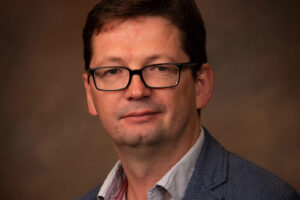
Dmitry Bedrov has been named as the new chair of the Department of Materials Science and Engineering (MSE). He replaces Mike Free, who will move to the appointment of associate chair of the department which Bedrov earlier held.
The Department, with two ABET accreditations, is seated in two colleges: the College of Science, which administers its Metallurgical Engineering program, and the Price College of Engineering, which administers its Materials Science & Engineering program. The merger of metallurgical and material science departments in 2018 was designed to streamline operations for faculty and students with significant funding from the Department of Energy for critical materials research. Metallurgical engineering faculty collaborate extensively with material science faculty. Many MSE students enroll in classes from chemistry and physics, bridging science and engineering.
Bedrov earned his BS with honors in 1995 from Odessa State Academy of Refrigeration in Odessa, Ukraine, followed by a PhD (1999) and postdoctoral work (1999-2002) in Chemical & Fuels Engineering and Computational Modeling of Materials at the University of Utah, respectively. His research interest lies in the area of multiscale modeling of soft-condensed matter systems that exhibit complex, multiscale structure often arising from molecular and super-molecular self-assembly.
New Lab, New Equipment
Bedrov’s arrival as chair is happening at an auspicious time for the department which has recently acquired a new, state-of-the-art additive manufacturing research center featuring a multi-million-dollar titanium 3D printing machine. The lab will serve as a hub for the collaboration between Metallurgical Engineering Professor Zak Fang’s powder metallurgy research team and the company IperionX as they work to advance metallurgical technologies for producing primary metals focused on titanium.
Other new equipment includes an X-ray Instrument to keep pace with the global-leading high-resolution 3D imaging research in metallurgical engineering at the U.
The X-ray Computed Tomography (CT) in 3D characterization of particulate systems significantly strengthens researcher capability in mineral processing studies. Together, these new acquisitions have helped maintain the U’s metallurgical engineering program as arguably the best in the country. Bedrov will lead MSE at a time when extensive collaboration is occurring on campus in the areas of materials informatics, additive manufacturing, and biomaterials and interfaces..
A key project emblematic of the department’s interdisciplinary research involves collaborating with the U’s School of Dentistry to use machine learning to optimize dental materials, like filler composites. Currently the evaluation of dental materials is predominantly qualitative, relying heavily on the experience and subjective judgment. Imaging of extracted teeth with deployed polymers followed by machine learning analysis in MSE can help clinicians, like dentists, understand the best formulations and application practices at work.
Read more about Bedrov’s appointment at the College of Science.